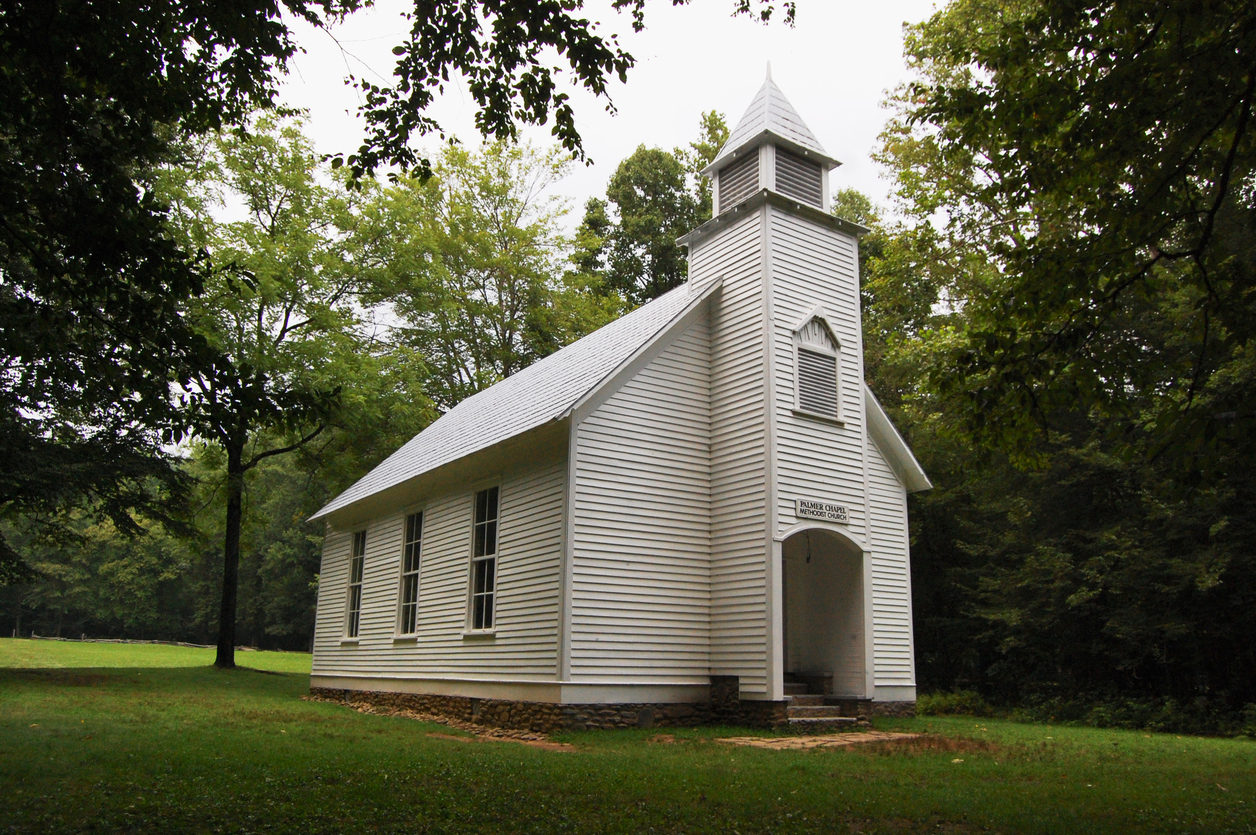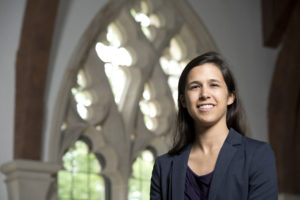
Supporting Rural Churches
Supporting Rural Churches
Students at Duke University's Divinity School gain hands-on experience while supporting the needs of rural churches.
At Duke Divinity School, aspiring New Testament scholar Julie Leyva found the academic rigor she craved. She also received an added bonus: an unforgettable side trip to Mount Gilead, N.C., a lumber-milling hamlet tucked in the loblolly pine forests between Charlotte and Fayetteville.
That’s where the Divinity School dispatched her for her field education experience, the internship rite-of-passage required of every Duke M.Div. student. The school sends students to churches where they teach Bible classes, Sunday school lessons and preach sermons under the guidance of local pastors or other supervisors. They must complete two units of field education, either part-time for 30 weeks or full-time in the summers for 10 weeks. In 2017, the Divinity School’s Field Education Office will place about 350 students in academic-year and summer assistant pastor roles.
Many of those placements will be facilitated by scholarships from The Duke Endowment. Tobacco magnate James B. Duke, who rose from rural poverty under the eye of his devoutly Methodist father, liked to say that if he amounted to anything in this world, “I owe it to my daddy and the Methodist church.”
Mr. Duke also felt strongly about helping rural communities, calling them “the bone and sinew of our country.” He specifically required through his 1924 indenture of trust that the Endowment support rural Methodist churches, even as it offered aid to orphans, selected universities and hospitals.
Given Mr. Duke’s charge, the Endowment has been supporting the field education program for more than 90 years, with an emphasis on rural churches.
Early leaders of both the Endowment and Duke University (named after Mr. Duke’s family) quickly saw the wisdom of providing internships for Divinity School students. In a statement published in the Endowment’s 1930 Year Book, Duke University President William Preston Few called the rural church field education internships “the most significant experiment of its kind that is at this time being tried out in the country.”
This summer alone, the Endowment is spending nearly $1.4 million to provide scholarships for 142 students to serve rural churches as assistant pastors. It will spend another $1.2 million to deploy 92 students during the academic year.
Rural churches get much-needed help, and students get real-world experience in sensitive, spiritually demanding roles that cannot be replicated within the confines of the university. Julie Leyva, for instance, spent two summers at First United Methodist Church of Mount Gilead, preaching, visiting the sick, and helping the pastor.
As a young Californian of Hispanic heritage, she wasn’t sure what to expect from rural North Carolina.
Mount Gilead, it turned out, had much to teach.
Lessons of a small town
Mount Gilead, population 1,200 and barely three miles square, abuts the 51,000-acre Uwharrie National Forest. Points of interest include the former Ford dealership on Main Street that’s been converted into a fancy restaurant called, plainly enough, The Old Ford Place; Brown’s Old Timey Hardware, with its creaky floorboards; and the sprawling lumber mill at the edge of town that ranks as the dominant local employer.
Leyva made herself right at home. Her time in Mount Gilead broadened her personal horizons, and deepened her insight into the Scriptures. It taught her that the scholarly questions that occupy her academician’s mind aren’t always the ones that pry the most meaning out of the text itself.

Julie Leyva, a Master of Divinity student at Duke Divinity School, in Goodson Chapel
photographed for The Duke Endowment
by Les Todd
“You can’t talk about interpreting Scripture in the church unless you actually do it in the church,” she said. “So often at Duke I feel like we do it in the abstract. When I hear people talking about it (at school), that doesn’t sound like any church I’ve ever been a part of, with regular people connected to the Bible. You have to have that (experience) or else it doesn’t make any sense.”
“You can’t preach in the abstract,” she added. “You have to know, ‘Who am I talking to? What do they go through every day?’ You can’t think of a sermon apart from the context.”
She graduated in May, and hopes to enter a Ph.D. program in 2018.
A different kind of classroom
Luke Christy, 23, fits the future-preacher mold the Endowment had in mind when it first began supporting field education. A second-year M.Div. student, he grew up in small towns around western North Carolina. His father was a Methodist minister, and the church ladies would pinch his cheek and tell him he was going to be just like his dad. They were right. In fact, Christy now hopes to serve in rural churches like the ones that gave so much love and support to his family.
During his internship at Goldston United Methodist Church in a tiny town southwest of Chapel Hill, members made him feel like a real pastor, even though he wasn’t sure what to say to people at times. When he first climbed into the pulpit to preach, he felt like a kid trying on grown-up clothes. But when the whole congregation sent him off by laying their hands on him and praying for him, he was profoundly moved.
Goldston United Methodist proved to be his favorite classroom.
“It helped me realize my education isn’t just for me,” Christy says. “It’s not just about me getting smarter. It’s about taking the next step in my call, getting ready to serve Jesus.”
Most Duke Divinity students find the experience as valuable as he did. A questionnaire administered by the Association of Theological Schools asks graduating divinity school students to rank 16 areas of work by importance in their formation for ministry. At Duke, the field education program ranks second, tied with Biblical Studies.
Fortifying rural communities
Rural churches can be a powerful force in creating more vibrant rural communities. Studies of social capital have shown that churches are often the last civil society institutions to leave communities as they decay, and the first to return as they rebound. Noted social scientist Robert Putnam has observed that people active in religious communities are more likely to give their time, talents and money to civic and community projects. Given that the National Committee for Responsive Philanthropy has reported that less than 1 percent of grantmaking foundations are devoted to rural development, churches’ civic and charitable impact looms larger perhaps in rural areas than anywhere else.
With that in mind, we at The Duke Endowment believe rural churches must be led by pastors who understand the dynamics of a rural community and the church’s place within it. The graduates of our program are taking the helm of churches across the Carolinas in places where rural congregations are confronting the loss of good-paying manufacturing jobs and struggling to keep their best and brightest young people from decamping to urban areas.
At a time when rural America is struggling, we are building leaders for rural churches, the institutions perhaps best positioned to help nurture and stabilize these fragile communities. We believe our efforts are making a substantial difference in the health of rural churches, and by extension, rural communities.
Still, to better understand the specific impact of field education, the Endowment’s Rural Church Committee has engaged Auburn University to evaluate Duke’s program. Findings will be compared with peer institutions to determine best practices and to seek areas of growth for educating agile and adaptive pastoral leaders. Leaders at the Divinity School are fully supportive.
“We wanted to partner with the school in this important exploration because we believe that experiential education is a critical component in ministerial formation,” said Robb Webb, director of the Endowment’s Rural Church program area. “Scripture lives and breathes in the local parish and we hope that the work with Auburn will provide an opportunity to discover the very best ways to integrate those powerful, embodied moments with the rigorous academic atmosphere of Duke’s classroom.”
Eric Frazier is the digital communications strategist for The Duke Endowment.
Philanthropy
The Duke Endowment
Project
Internships for rural ministry


